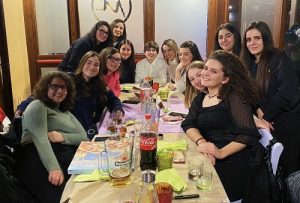by Brooke Duda, University of Connecticut
I chose to take the Critical Disabilities course at Umbra because it aligned well with my previous involvement with special needs communities at home. This course allows students to work closely with VIVA Sports Association, which is the first athletic program for children and young adults with motor and/or intellectual disabilities in Perugia.
I have a lot of experience interacting and working with disabled individuals. In high school, I coached Unified Sports and helped teach American Sign Language, integrating students with and without disabilities. I helped run an annual campaign called ‘Spread the Word: Inclusion’ to eliminate the use of hateful vocabulary. This past summer, I worked as an Inclusion Coach, providing support to individuals with special needs so they could participate with their non-disabled peers in a variety of Park System programs.
I thought that learning about how disability is handled and viewed in another culture would be extremely valuable for my career interest in speech pathology. I wanted to become more cognizant of cultural differences and learn new ways to view disabilities. This course met and exceeded my expectations. Viva was the place where I felt most integrated into the local community during my time in Perugia. Each Monday we met in the classroom and every Wednesday we took a bus to the gym that Viva uses.
The greatest challenge was the language barrier. Our class has five students and none of us are fluent in Italian, so communication was difficult, particularly in the first few weeks of the course. However, playing sports allowed us to communicate in a more physical way. We could observe and learn the rules by example from the other players. As we came each week, the volunteers and participants started to recognize us, say hello, and invite us to participate. Even though I couldn’t hold long conversations, my introductory Italian class helped me recognize some words and be able to ask and answer basic questions.
The students in our class alternated between two three-hour shifts. I had another class afterward, so I was always on the early shift. The first few hours at Viva were more structured than the second half, so we played basketball every week as a team. The players were mostly young adult men with various disabilities, including Autism Spectrum Disorder and Down Syndrome. Those who had a harder time keeping up with the fast-paced games would stand on the side, where they would occasionally get the chance to shoot the ball and earn points for their team.
Later in the day, more people came, including people with visual or physical impairments like wheelchairs, as well as some younger participants. After the more structured, high-level games ended, the environment became much more relaxed. The students in the second shift got the chance to interact more one-on-one with Viva participants, walking with them, and helping them complete obstacle courses and other games like Ping Pong.
This course allowed us to apply what we learned in class to an environment outside the classroom. We discussed the connection between sports and disability and how all children have similar motivations to be active. This was clear to see at Viva, where everyone seemed very excited to participate and be part of a team. Disabled children are unfortunately less active, on average than non-disabled children. Inclusive sports programs are very impactful to help close that gap. Sports are beneficial in many ways, including health, problem-solving, teamwork, social skills, goals, learning, empathy, and communication. The biggest benefit I saw at Viva was social inclusion. I could see friendships form and evolve over the semester between participants, in addition to feeling valued as part of a team.
This course helped us see the benefit of programs to include people with disabilities, who are often excluded from mainstream society. I enjoyed making connections between my experiences in the States to my experience at Viva. I learned how to communicate with a language barrier and saw the value of inclusion in a new context.


